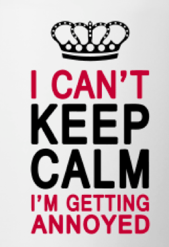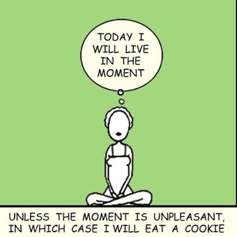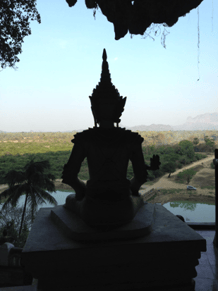Where does stress come from?
As sure as the sun rises each day, we all face times of stress. What gives us stress varies from person to person, and our stress triggers may evolve and change over the course of our lives, from feeling hungry as a baby to being excluded from a friend group to getting into a dream college or financing a house later in life. Most of the time a situation feels inherently stressful: something annoying, unexpected, or upsetting happens, and we react reflexively with a negative emotion.

The purpose of this blog post is to propose that events and situations are not inherently stressful; rather, it is our reaction to these events that creates the turbulence of stress, like ripples across the pond of our lives. By reframing stress in this way, we are empowered to see that we have ownership over our stress. This ownership is not easy, however, as we’ve formed habits over the course of our lives to react to certain triggers almost instinctively with stress or anger or irritation, but meditation and mindfulness can help seed new habits of watchfulness and acceptance.

Gazing inward.
First, observe yourself and notice where your thoughts wander. When a teacher assigns a major assignment with little advance notice, is your first thought panic--"I won’t be able to finish this"? Or are you kind to yourself with an affirmative thought--"I can do this” or “I’ll do the best I can”? These thoughts seem incredibly minor, which is why we often don’t learn about them from our parents or teachers or social media. But our minds have incredible power over our ultimate external realities, as many experiments in psychology and medicine have demonstrated. Moreover, thoughts and emotions can reinforce each other in a vicious cycle, so a key part of de-escalating stress is keeping tabs on that internal monologue, whether it makes us panic or calms us down.
You’ll notice another interesting thing as you start watching, which is that the chatter in your mind dissipates once you draw your attention to it, like sunlight evaporates fog. This can allow us to not get caught up in a thought-emotion cycle and instead be present with the emotional experience we may be having. What does stress feel like in your body? Does your heart rate increase? Your stomach clench? Observe those sensations without judgment--and observe, too, how they pass away, clouds moving across the sky.

Meditation as bicep curls for your mind.
This non-judgmental watching that I just described is the same thing as “mindfulness,” a very trendy state of being lately, but it’s hard to up and start being mindful right off the couch, especially when we’re stressed. Fortunately, we have an exercise to help us: meditation. Maintaining an accepting state of awareness is just as hard as training our bodies for a sport, and it requires the same discipline and practice. There are many different forms of meditation, but the one that I like to start with is simply sitting cross-legged in a quiet place with a timer set for 10 minutes (Insight Timer is a nice app with a gong timer). When you first start meditating, focus your mind on your breath, on your inhalation and exhalation, and on the rise and fall of your stomach and chest to anchor your thoughts.
However, your mind will inevitably wander to think about an upcoming test or what you want to eat for lunch. Accept these wandering as part of the process, and re-direct your attention back to your breath. When sensations arise in your body, like an itch, try to observe (without scratching!) and watch it, eventually, pass away. As a medical student, I recognize that this small daily practice is one of the most important things I can do for my own mental well-being and for my future patients -- because being present and quieting your own mind is critical to being a good listener.

Helpful beyond managing stress.
Calming your mind--and in turn, your emotional responses--isn’t just great for modulating stress, but it helps us cope with all kinds of emotions that arise throughout our lives. I think Austrian psychiatrist Victor Frankl, who survived a concentration camp during the Holocaust, explains this concept very well in his short but powerful book Man’s Search for Meaning. He writes that, “Between stimulus and response there is a space. In that space is our power to choose our response. In our response lies our growth and freedom.” So much of our lives can be consumed with achieving external goals--grades, PRs, good looks, awards--but the challenge I wrestle with myself and that I offer to you all is to carve out space in the busy day for our internal work, for our true growth and freedom.

Learning resources for meditation.
The Headspace app offers 10 free introductory meditations as a “Level 1 series” which I think are pretty well done and useful for getting your feet wet (I disclose no financial relationship with either app mentioned here!) Another option is a meditation retreat, i.e. bootcamp to get you quickly experienced in the technique. I had a wonderful experience with a Vipassana retreat (dhamma.org), which are non-denominational and pay-what-you-can courses offered all over the world. Please feel free to reach out to me with any questions or thoughts--I’m always excited to talk to people about how to get into meditation and share ideas!
Interested in working with Anna?
Check out some of our other blog posts on study tips below:

Comments